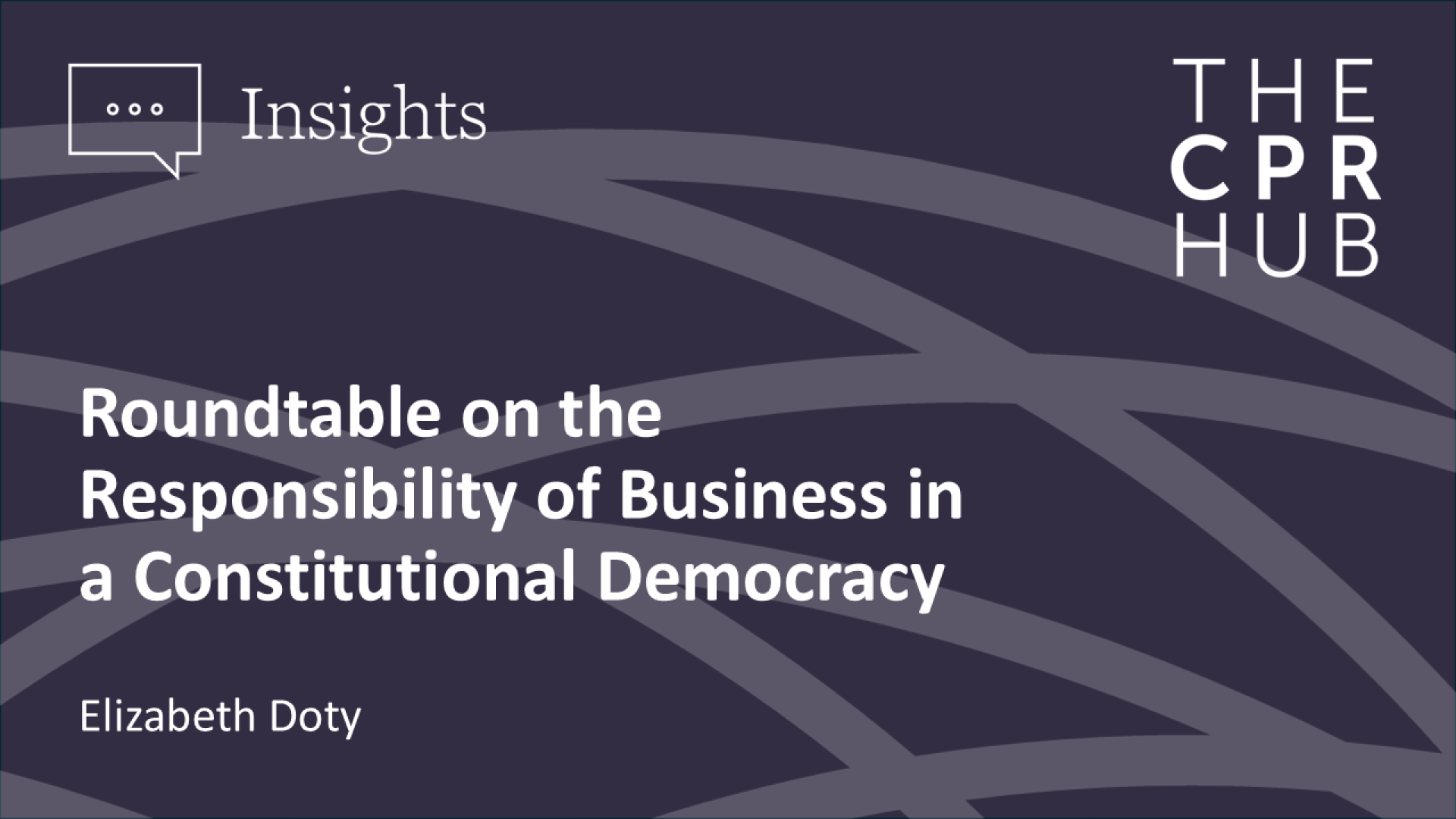Receive Updates from The CPR Hub
Learn about new tools, insights and events to help you consider how CPR can help your company, clients or members.








Written as a CPR Independent Study project at the Stephen M. Ross School of Business at the University of Michigan, this report outlines ways to bring CPR concepts into five areas of the business school curriculum, including: Business Law and Ethics Courses, Business Economics and Policy Courses; Finance Courses; Business Strategy Courses; and Business and Society, Social Responsibility and Sustainability Courses. Drawing on the Erb CPR Principles the report outlines detailed suggestions for "caselets" and videos that are most relevant for each topic area, as well as sample discussion questions.
To rebuild election trust among conservative voters, this Johns Hopkins–R Street tool outlines three actionable principles: affirm past election integrity, increase process transparency, and improve election operations. It pairs these with Gallup-backed data to guide civic leaders—including business—on addressing doubts without heightening polarization.
This third edition of the Democracy Playbook offers evidence-based best practices for reversing democratic backsliding, to help citizens and stakeholders reclaim good governance, transparency, and the rule of law, and strengthen democratic resilience. It outlines how the business sector has historically supported these efforts by fighting corruption (Pillar 3) through actions like opposing state capture, supporting anti-corruption laws, and protecting whistleblowers, in addition to making democracy deliver (Pillar 7) through fair wages, labor rights, and investment in underserved communities. It calls on companies to continue this role, emphasizing that democratic stability is essential for reducing risk and sustaining long-term economic opportunity.
This briefing is the first in a series that applies effective corporate climate engagement to a particular sector - in this case, transportation. The brief provides five key facts board directors need to know about corporate climate policy engagement in relation to road transport; a snapshot of the current policy and corporate advocacy landscape for road transport and five steps board directors can take to support effective corporate climate policy engagement in the automotive and trucking industries.
This piece explores how companies can maintain ethical business practices as geopolitical tensions and authoritarianism erode global consensus on anti-corruption and rule of law. The authors argue that compliance systems alone are insufficient and call for stronger values-driven leadership, cross-border ethical alignment, and proactive stakeholder engagement to navigate growing political and moral complexity.
As a company’s engagement in social and political issues becomes increasingly fraught, this article lays out decision-making principles companies can use to determine whether and when to engage in social and political issues.
Eccles draws on a survey of 884 sustainability experts in 72 countries, which finds that NGOs’ go-to tactics—such as boycotts, litigation, and public shaming—are seen as low-impact and risk fueling backlash. It points instead to higher-leverage strategies like policy advocacy, education, and constructive engagement with skeptics as more effective paths forward.
Tells the story of Alaska’s landmark adoption of open primaries and ranked-choice voting, showing how these reforms empowered broader voter participation, curbed partisan gatekeeping, and led to more representative, cross-partisan governance—offering a powerful blueprint for restoring trust in democracy. Includes an analysis of the impacts of current election processes and rules -- such as closed primaries, uncontested seats, and winner-take-all elections -- as well as the arguments against the reforms adopted in Alaska.
Authored by the Energy Transitions Commission, representing a wide array of perspectives, this report proposes a pathway to a net-zero global economy by mid-century. Specifically, it outlines three priorities for the 2020s: scaling proven zero-carbon solutions, creating supportive policy and investment environments, and advancing next-generation technologies for hard-to-abate sectors. It emphasizes practical actions for governments, investors, and businesses and stresses global collaboration to meet climate targets.
As investors increasingly focus on systemic risks, few risks are as consequential as the weakening of democratic institutions and the rule of law -- or today’s once-in-a-generation operational and strategic challenges from AI, an increasingly chaotic political environment, and more. Yet, as an investor, it can be difficult to translate these systemic risks into concrete actions. Focusing on public affairs governance – how companies make decisions about whether and when to engage in the public sphere, can be one helpful lens.
This new tool from Third Side Strategies helps investors to ask sharper questions—of companies and of themselves. It introduces the concept of CPR Governance (a set of best practices for whether and when to engage in the public sphere) which helps investors in two ways: (i) prompting companies to think more concretely about their public affairs practices and strengthen any areas of weakness highlighted by the questions, and (ii) providing investors the information needed to more effectively manage this systemic risk across their portfolio.
This playbook sets out practical guidance for companies on how to optimise their indirect “policy footprint”. It covers how to assess and improve associations' alignment and impact, by clarifying their strategic policy priorities, evaluating where to invest in important trade association relationships, and engaging those associations constructively and effectively.
Provides a framework for boards to manage the reputational, legal, and financial risks of political spending, including misalignment with public commitments, shareholder backlash, and regulatory scrutiny. Emphasizes the need for transparency and alignment with a company’s stated objectives and strategic goals.
This guide offers conversation practices and norms that help people move beyond political echo chambers, enabling genuine learning, mutual understanding, and connection across divides.
This academic article analyzes how political polarization affects corporate nonmarket strategies—such as lobbying, advocacy, and coalition-building—across different stages of the policy life cycle. It shows how polarization changes the risks and payoffs of engagement, complicating firms’ ability to influence policy without triggering backlash or strategic misalignment.
In partnership with Chronos Sustainability, this article reflects a survey about (i) how investors identify and assess political engagement activities; (ii) how investors integrate political engagement into their stewardship activities; and (iii) challenges to engaging on responsible political engagement with investees.
This piece proposes that trade associations are positioned to be powerful groundbreakers for business—helping shape rules that enable long-term value and healthy competition. But without clear standards, the authors argue, these same associations risk acting as bodyguards for narrow interests, distorting markets, block innovation and undermining trust in business and government. This piece proposes applying CPR principles—Legitimacy, Transparency, Accountability, and Responsibility—to guide more consistent, credible association advocacy aligned with shared business and societal goals, and the ultimate promise of free markets.
Housed in Duke’s Fuqua School of Business, is an initiative to explore the role business can play to reduce polarization and improve civic dialogue. Their website offers research and data on dialogue and engagement, showcases corporate initiatives that build common purpose, features news and business leaders’ perspectives, and hosts events to equip current and future leaders to navigate polarization and foster constructive conversations.
This report based on extensive empirical research shows that, while political extremes dominate public discourse, most Americans belong to an “Exhausted Majority” who feel overlooked and frustrated by polarization. It underscores the need to elevate voices that champion trust, empathy, and shared values.
Based on interviews with more than 23,000 citizens across 31 countries, Ipsos finds persistent public distrust in elites, globalization, and economic systems—driving polarization across both advanced and emerging economies. These trends underscore the need for companies to account for public sentiment and political division when shaping public affairs strategies and stakeholder engagement, especially in regions where legitimacy and trust are increasingly strained.
Data analysis shows that voters labeled as moderates, independents, or undecided hold diverse and often conflicting views, undermining the idea of a unified “moderate middle” in today’s polarized political landscape.
Allstate’s 2025 research finds that trust in America is at a tipping point. While only 41% of Americans trust people across the U.S., the majority remain optimistic about their communities. The report emphasizes that rebuilding trust starts locally through engagement, leadership, and connection, and offers a three-part strategy: fostering interpersonal trust, investing in community leadership, and scaling trust-building efforts to strengthen democracy and economic resilience
This article examines how past negotiations, or precedents, shape current negotiations by guiding strategy and providing tested solutions, while also potentially constraining new thinking. It offers practical insights for managers on how to create, apply, and navigate precedents effectively to influence outcomes.
This research paper provides data that shows the costs to companies of deciding not to speak up on certain issues and the negative stakeholder response to such decisions. The researchers theorize whether and when consumers will negatively respond to corporate silence on a social issue based on the visibility of silence.
Emerging student groups at UC Berkeley are creating spaces fostering respectful connection across political divides by promoting civil discourse, hosting open debates, and offering courses that equip students with skills to engage diverse perspectives—grounded in the belief that seeking knowledge is the primary mission.
Learn about new tools, insights and events to help you consider how CPR can help your company, clients or members.
